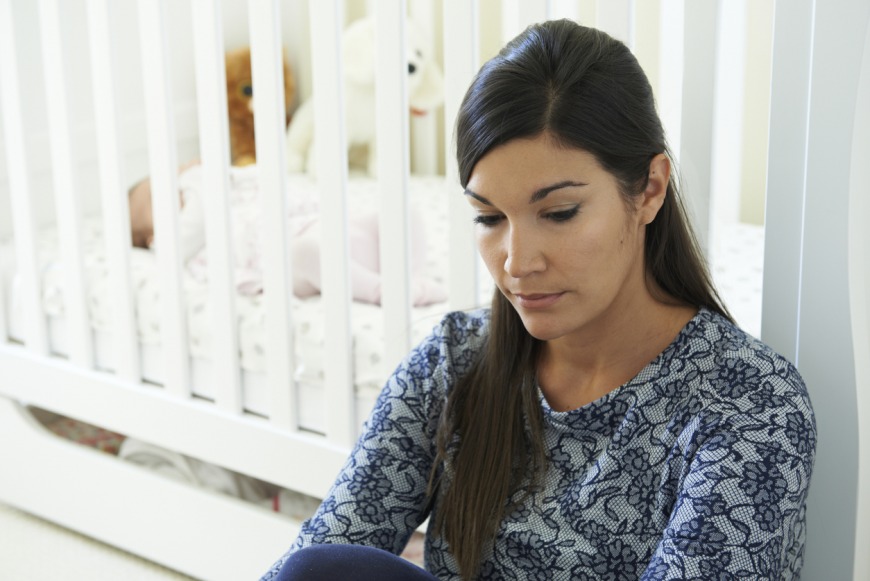Everything You Should Know About Post Natal Depression
It's a type of clinical depression which can affect women after childbirth
9 January 2013
Editor

Postpartum depression, also called postnatal depression, is a type of clinical depression which can affect women after childbirth.
How common is PND?
PND is quite common. It occurs in 10 to 15 per cent or one in seven to ten mothers.
When does PND occur?
PND usually develops within the first month following childbirth. It may develop out of severe 'baby blues'. Episodes of depression may be more common in mothers for many months after having a baby. Where PND stops and ordinary depression begins is unclear.
What are the symptoms of PND?
The symptoms are very similar to those seen in 'ordinary' depression. Feeling 'low', 'miserable' and tearful for no apparent reason. These feelings persist for most of the time, though they may be worse at certain times of day, particularly the morning. Being unable to enjoy yourself. This may be particularly prominent in new mothers who feel that they are not enjoying having a new baby in the way they expected to. Irritability is common. This may be with other children, the new baby and particularly with the partner. Sleep disturbance is part of looking after a new baby. However in PND there may be additional problems of finding it hard to go to sleep even though you are tired, or waking early in the morning. Given that looking after a young baby means having less sleep than usual, it is no surprise that mothers often feel they have no energy. This can be even worse in mothers with PND.
Appetite is sometimes affected, with mothers not being interested in food. This can be a particular problem since new mothers need all the energy they can get to look after their babies.
Anxiety frequently occurs in PND. This may take many forms. It may be feeling tense and 'on edge' all the time. Normal concerns and anxieties that any mother feels for a new baby may become overwhelming. In addition mothers may experience 'panic attacks', which are episodes lasting several minutes when they feel as if something catastrophic is about to happen – such as collapsing, having a heart attack or stroke. These are extremely frightening, but they get better on their own.
Depression is often accompanied by feelings of being 'worthless' and 'hopeless'. These feelings are common in PND. All mothers are faced with new and sometimes difficult problems with a new baby. However, mothers with PND feel all the more 'not able to cope' and unable to see a way through their difficulties.
When people are depressed, they sometimes feel that there's no way out of their problems and that they, and their family, would be better off dead. Thoughts of suicide are therefore not uncommon. If you feel this way, it's important that you talk to somebody about how you feel, since there are ways out of your difficulties other than suicide. You should also be aware that your child would be at increased risk of developing mental health problems of their own if you do commit suicide. If you fear that somebody you know feels suicidal, take this seriously and try to talk to them about it. Talking about suicide does NOT increase the risk of the person committing suicide. Strongly advise the person to visit their doctor.
What causes PND?
The simple answer is we don't know. It's likely that a number of factors are involved. The illness may arise partly because of the hormonal changes following childbirth. The stress of looking after a young baby and having your sleep disrupted may also help to bring on the illness in susceptible people.

Are some mothers more likely to get PND?
PND is more common in mothers who have previously had episodes of depression. A history of depression in family members also increases the risk, probably via genetic (inherited) factors.
PND is also more common in mothers who have experienced stressful life events during the pregnancy, those who do not have support at home, in those in whom the baby was unplanned or unwanted, and when the baby has been born with some problem.
How is PND treated?
PND is treatable. It's treated in much the same way as ordinary depression. Talking about the problem with somebody, such as a health visitor, can be helpful. Getting extra support and help with looking after the baby is also important. Sometimes antidepressants are necessary. Although this can cause problems with breastfeeding, since some drugs get into breast milk. There are drugs that are safe. You should remember that the most important thing both from the baby's and your point of view is to get better as quickly as possible. In this regard there are a few things that you are able to do to help.

























.png?itok=SvZPqMHH)




.png?itok=uB2ieOR7)












